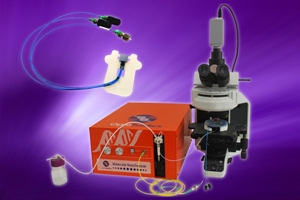Sep 19 2013
Avo Photonics, specialists in opto-electronic systems requiring precision optical alignment, has been chosen by Optofluidics to provide system design and manufacturing services for their molecular NanoTweezer system.
 Avo provides packaging services for the Optofluidics NanoTweezer. (Photo: Business Wire)
Avo provides packaging services for the Optofluidics NanoTweezer. (Photo: Business Wire)
The NanoTweezer is made up of three components: a microscope flow system that sits atop the microscope platform, removable waveguide chips which are inserted into the flow system, and a bench-top control unit. Optofluidics’ breakthrough technology allows users to isolate objects more than 10 times smaller than those trapped by traditional optical tweezers. Using a beam of light to capture nanoscale objects floated in fluid, such as individual cells, viruses, single bacteria, nucleic acids, metal nanoparticles, carbon nanotubes and some proteins, optical tweezers provide a way for these particles to be studied and manipulated under a microscope. Conventional optical tweezers use lenses to focus the optical spot in the far-field, causing capturable particles to be restrained by the Rayleigh limit. The NanoTweezer uses photonic resonator chips to create a miniscule aperture in the near-field, allowing the beam to attract particles as small as 5nm in size. The 1060nm-wavelength laser beam causes no negative heating effects or other damage to biological objects. The ability to safely isolate and study particles of this size is critical for future advancements in physiology, medicine and material science.
For this project, Avo provided the design and production of disposable assemblies consisting of three single-mode, polarization-maintaining fibers hard-coupled to a NanoTweezer chip, which contain Optofluidics’ waveguide technology. With a mode field diameter of nine microns per fiber, and an even smaller aperture for the waveguide, the alignment of these two components required Avo’s innovative design for alignability, stability and robustness while balancing the cost constraints associated with disposable materials.
Additionally, Avo created the means to tune the wavelength and control the power of the laser through the bench-top NanoTweezer system. Through manipulation of these settings, the wavelength of the laser can be tuned to a resonance in the waveguide to enhance the optical tweezing effect.
“This technology is a really cutting edge way of manipulating nanoscale objects, and Avo helped us realize our goals much more quickly than anticipated,” says Dr. Robert Hart, Chief Technology Officer of Optofluidics.
Keith Forsyth, principal engineer of Avo Photonics, offered, “Optofluidics is doing groundbreaking work. The ability to control the movement of ever-smaller objects with light is a critically important tool for many biological applications, now and in the future. We are excited to be a part of this development and look forward to volume production of NanoTweezer systems and disposable fiber-coupled waveguide chips.”
Optofluidics, Inc. is a Philadelphia-based life-sciences company that has been developing microfluidic and biophotonic nanomanipulation technologies for biological, material science, and pharmaceutical applications since 2011. In 2012 Optofluidics was named Philadelphia Life Sciences startup of the year. To find out more about The Optofluidics Corporation, visit www.optofluidicscorp.com.
For more information about Avo Photonics, email [email protected] or call 215.441.0107.
Source: http://avophotonics.com/